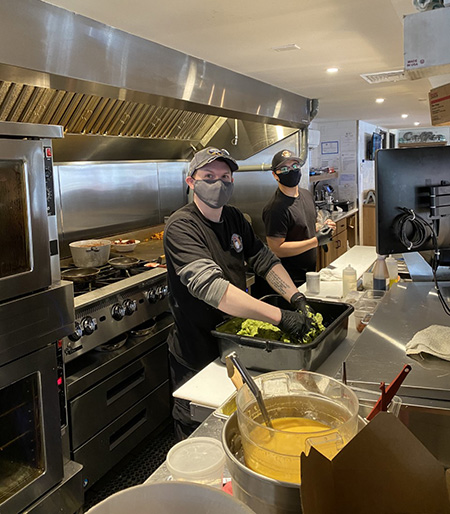The Pandemic has shifted the Public’s Platter
by Cole Allenby
During the winter months on Cape Cod, many local restaurants and eateries have been forced to instantly put away every potential platter to satisfy the pandemic’s orders. Given the minimal tourism this winter, less than usual, many feel that the future of restaurants is bleak. Throughout the interior of the Cape’s beloved locations, the prominence of the pandemic’s impacts is seated all around as well as stirred in the kitchen; partitions are up in between tables along with all delectable productions. Regarding the alterations to the temperature of business that have been made by the pandemic, many local business owners, managers, and chefs have been eager to discuss this.
“It’s definitely slowed down,” said Kim Bohnenberger, manager of the Cape Cod Coffee Café and Restaurant. “Our sales are down a little bit it was good because we had a lot of outside seating and people accountable sitting outside but once it got colder, we really felt it even more.” When staring at the dish of a chef’s perspective, the effect is even more prominent. “It has dramatically affected our business,” said Jonathan Guinta, head chef at the Cape Cod Coffee Café and Restaurant, “pretty much cut our numbers almost in half. More people are doing takeout rather than dining in.” This falls in line with many of the statistics that have been gathered during recent months. According to the statistics that have been provided by Professor McCormick, the Massachusetts Restaurant Association has reported that 4,000, or 22% of the state’s restaurants closed permanently in 2020. Before the pandemic in December of 2019, restaurants had employed 10% of Massachusetts workers and had expected to raise $1.3 billion USD in meal revenue taxes.

Image: provided by Cole Allenby
The drastic disturbances from COVID-19 are incredibly apparent in currently employed restaurants. Absent personnel from many restaurants’ waitstaff are a collection of many college and high school students. “We were still able to bring them in a little bit more if that they’re not in school,” said Bohnenberger. “It really has not it really affected them too much. Students still came in and worked on the weekends while they are in schools and they were able to work in the summer. They were a little bit more eager to work because they weren’t collecting unemployment, so I actually had a lot of students in the summer working full time for that reason because they wanted to work, they weren’t collecting anything.” Paul McCormick, owner of the Ebb Tide restaurant and Culinary Arts Professor at Cape Cod Community College (4Cs) feels that students have had to confront additional disheartening changes since the start of the pandemic. “They have said that although many are working,” said McCormick, “they do not receive the number of hours that they have had in the past and that has created a lack of funds. Some have lost their jobs and have decided to take more classes to finish their degrees.”
Despite the pandemic rattling the mind’s comprehension or cutlery of such changes, the future of restaurants in Massachusetts is not lost. Governor Baker has recently allowed all indoor dining establishments to increase their capacity from 25% to 40%. As vaccinations continue to be distributed prior to summer, the outlook is bright. Once larger venues— such as weddings, receptions, and parties — can resume, restaurants can expect to benefit from this first step. “I do believe that when the pandemic is finally over,” said McCormick, “the restaurant business will emerge stronger than it was before. There are many job opportunities that will be available particularly if foreign students (J-1s and H2B) are not allowed to return to work during the season. There should be a resurgence of jobs when the seasonal liquor licenses become in effect on April 1st and when the weather turns warmer and outside dining can resume… I think that the
Cape as a region has been very fortunate. We were blessed with a dry hot summer last year, beaches filled, and visitors who were willing to drive to their vacation destination. The season also extended because school age children, and college students attended remotely, and their families could return to stay on the Cape or stay longer.”
Given these hopeful words, local eateries are looking forward to the summer. The annual surge that tourism provides, coupled with the wistful relaxation of many restrictions for dining establishments, paints a bright future for restaurants on Cape Cod. Supporting local eateries by either dining in, or even just taking out food, is the best that the community can do at this time. Many of these employees hope to see bright faces at their tables once again, as do many customers.
Categories: Food, People